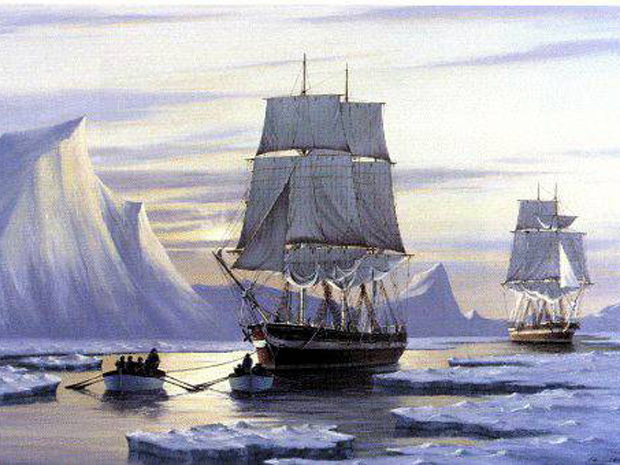
Canada claims that the waters of the various routes of the Northwest Passage (NWP), a northern water route between the Atlantic and Pacific Oceans, are a part of Canadian internal waters. However, the United States continues to assert that the Passage is an international strait.
The legal definition of historical waters, as defined in the Fisheries case of 1951 states: “‘Historic waters’ are usually meant for waters which are treated as internal waters but which would not have that character were it not for the existence of a historic title.” Canada’s claim is based on the historical claim that British explorers mapped the archipelago prior to the transfer of title in 1880, and the area has been subsequently patrolled and policed by Canadians. Canada inherited the Arctic islands from Great Britain in 1880. As a result of this territorial gain, Canada benefits from all prior British exploration. Beginning with the expeditions in search of a Northwest Passage from 1576 to 1847, and ending with those in search of Franklin’s Expedition from 1847 to 1859, British explorers covered virtually all the waters of the Arctic Archipelago.
Recent developments regarding the Franklin Expedition, the British naval voyage to find the Northwest Passage, strengthens Canadian claims of sovereignty in the Arctic. Prime Minister Harper’s passion for Canada’s North is rooted in its potential and historical importance. He proclaimed that locating the Royal Navy ship was a “historic moment for Canada,” since these vessels were trying to traverse what is now Canada’s prized Northwest Passage.

- Side-sonar scan image of one of the Franklin Expedition ships on the seafloor of the Queen Maud Gulf. (Parks Canada)
Harper describes the expedition as having laid the foundation for Canadian sovereignty in the region. While Harper’s position is supported by some experts, other Arctic experts such as Rob Huebert, of the Centre for Military and Strategic Studies at the University of Calgary, disagrees with the claim that the Franklin Expedition lays the basis for Canadian sovereignty in the region. They argue that the two British naval ships found in Nunavut were lost decades before Confederation therefore it does not contribute to the debate over the status of the NWP.
Secondly, Canadian claims over the Passage stem from the heritage and cultural legacy of Canada’s indigenous population. The use and occupation of the sea-ice by the Inuit, who hunted, fished, travelled, and lived on the Northwest Passage for millennia make a practical basis for the Passage being internal waters. Canada’s vital interest in the Northwest Passage is derived from the risk of environmental degradation resulting in damage to its local population. Not only does the harvesting of marine-related resources constitute a vital need for the survival and welfare of the Inuit, but the continuation of their entire way of life depends on those resources.
The economic and cultural dependence of the Inuit on the sea-ice is a critical aspect of Canada’s claim. This fact is emphasized in the Nunavut Land Claims Agreement of 1993 between the Canadian government and the Inuit, which affirms “Canada’s sovereignty over the waters of the Arctic archipelago is supported by Inuit use and occupancy.” The Nunavut Land Claims Agreement affirms the intent of the Inuit to transfer to Canada any rights they might have had over the sea-ice under international law. The importance of an equal partnership between the federal government and the Inuit regarding the protection of the North cannot be underestimated.
Canada has a strong moral obligation to protect its Inuit population, thus making it more practical for Canada to have jurisdiction over the Passage. At one time, all 28 Inuit communities of the Canadian Arctic depended exclusively on hunting and fishing for their livelihood, particularly so for the old community of Pond Inlet on the south side of Lancaster Sound. The waters of Lancaster Sound, the principal eastern entrance to the Northwest Passage, and its vicinities constitutes one of the most biologically productive and ecologically sensitive regions in the Arctic.
Prime Minister Trudeau initiated protections for the Arctic environment through the Arctic Waters Pollution Protection Act (AWPPA). Therefore, any future use of the Passage must build on the existing AWPPA and examine contemporary environmental concerns to further protect Arctic waters. Any disruption to the already fragile ecosystem in the Arctic, from the increase in marine transits through the NWP, risking oil spills and fuel run off from voyages, will directly affect the livelihood of Canada’s Inuit population. Therefore, the Inuit extension of rights to Canada, combined with the moral obligation to protect the Inuit homeland from environmental disasters strengthens the status for internal waters.
Lastly, the melting sea-ice, as a result of climate change, has improved access to resources in the Arctic and made the NWP available to more ships for longer periods in summer. Melting sea-ice reveals the possibility of offshore drilling for oil and natural gas. Disappearing glaciers uncover million-year-old deposits of precious metals waiting to be mined.
Arguably, Harper is using the search for HMS Erebus and Terror from the Franklin Expedition to demonstrate physical evidence to further establish internal status over the NWP. Furthermore, Ottawa’s interests in the recent finds may be to protect national economic interests in the Arctic from American, Russian and Chinese interests in shipping and energy development in the region.
If the recent developments in the Franklin Expedition ultimately strengthen Canadian sovereignty over the NWP, and allow it to economically benefit from the status, then Canada must accept the environment responsibilities that coincide with the status of internal waters. Canadian historical claims must be recognized in tandem with Canadian obligation of environmental protection of the Passage.





